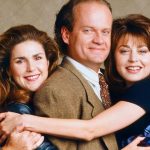On February 8, 2020, the world lost a true legend. That was the day that actor Robert Conrad lost his battle with heart disease, passing away in Malibu, California, at the age of 84.
Conrad perhaps best known for his role as a secret service agent named James T. West in the hit CBS science fiction western series The Wild Wild West, which ran from 1965 to 1969. He later portrayed World War II ace Pappy Boyington on the critically acclaimed. Albeit relatively short-lived, NBC military drama series Baa Baa Black Sheep.
Beyond just acting, Conrad was also a talented singer who recorded several pop-rock singles in the late 50s and early 60s under the name Bob Conrad. More recently, Conrad hosted a weekly nationally syndicated radio program called The PM Show with Robert Conrad beginning in 2008. His last appearance on the show was on July 19, 2019.
Throughout his career, Conrad became known for his tough-guy image. During his years on The Wild Wild West, he famously performed all of his own stunts with greater enthusiasm than the wildest stunt people of his day.
Because of his work onscreen, people started viewing him as a very intense individual who shouldn’t be messed with. This reputation seemed to follow him even when the cameras weren’t rolling.
Even though he seen as the kind of man that was more than capable of holding his own. Robert Conrad often struggled to hold it all together. His story is one that is marred by hardship, loss, and relationship struggles. Join Facts Verse as we attempt to see beyond Robert Conrad tough-guy image and understand who he really was.
He Was Oozing With Charisma Even In His Younger Years
Robert Conrad was every lady’s dream guy back in the day. He was charming, attractive, and confident. Women and even some men, both young and old, couldn’t seem to get enough of him, especially during his younger years.
After establishing an acting career, Conrad took a stab at a music career under the name Bob Conrad. He put out a number of pop and rock singles in the late 50s and early 60s while occasionally being featured on the airwaves as a radio presenter.
He was a very macho guy and had little trouble incorporating elements of his own personality into his film roles. His rugged personality developed as a result of his childhood. Robert was born in 1935 to teen parents on the South Side of Chicago.
His father, Leonard Falk, worked at a New Jersey plant that produced chocolate flavoring, while his mother, Jacqueline Hubbard, found work as a publicist.
The young couple divorced when Robert still quite young, leaving Hubbard to be his primary caretaker. While raising Conrad, Jacqueline taught him to be tough, knowing how unforgiving the world could be. He likely also developed some of this trait while studying at a strict military school.
Hubbard eventually remarried. After which, Conrad sent off to go live with his grandmother. His experience in the military school showed him the value of being fierce and fearless. And he’d carry these values with to the grave.
At 15, without apprehension, Robert enlisted in the Marines. But he kicked out after his superiors discovered how young he was. Even back in those days, you still had to be at least 17 to join the armed forces.
Undeterred by getting booted out of the military, Conrad clung to his ruggedness. Once he found his way to Hollywood, this trait would be one of his most valuable assets. But it would still be quite some time before he found his true calling in the entertainment industry.
He Was A Broke College Dropout When He Eloped With His First Wife
Conrad was always very much in touch with his masculinity. And he displayed it in just about every way that you can think of, but when it came to matters of the heart, he wasn’t afraid to allow his emotions guide him. He loved passionately and, at times, blindly. At times, his heart would even take him off his established path.
While studying at Northwestern University, the Chicago-native met and fell madly in love with Joan Kenlay. Instead of finishing up his schooling, he dropped out and eloped with her in 1952. Joan came from a very wealthy family. Her father was a successful lawyer, and she was attending a prestigious religious boarding school when she met Conrad.
In stark contrast to Kenlay, Conrad, who was only 17, was broke as a joke with no career, fame, or even a job. So, in an attempt at making himself look a little better with Kenlay’s family and be a decent provider. He lied about his age once again, claiming that he was 21 so that he could get a job as a docker.
Despite coming from two very different walks of life, Conrad and Kenlay remained inseparable. They actually ended up changing names to shield their respective identities after Joan’s family objected to their union. The only way to stay together was to assume new identities and elope, so that’s exactly what they did.
Later that year, they eventually revealed their whereabouts once they were all set to welcome their first child. To make ends meet, Conrad jumped around from job to job. In addition to working as a docker, he also found employment as a candy factory worker and milkman. Although money was scarce, he and his young wife managed to remain happy.
Two years after the young lovers settled down, Conrad suddenly lost his job as a docker after handing out a petition seeking to can their union steward.
After getting the ax, Conrad began singing at cafes. Although talented, he didn’t find any success until meeting Nick Adams, a friend who promised to help him get a head start in Hollywood.
In 1957, with the help of Adams, Conrad signed a contract with Warner Brothers earning him $250 a week. His first role was playing a private investigator named Tom Lopeka in the television series Hawaiian Eye.
With Success Came Expectations
For the next several decades, Conrad made quite the name for himself playing tough guys on TV. And while he loved these kinds of roles and put much of his own personality into each of his performances. His image would end up becoming something of a blessing and a curse.
In 1971, Robert was preparing to stage a return to television as the star of a new Jack Webb produced series called The DA. While promoting the new program, Conrad made appearances on two Adam-12 crossover episodes – the first of which entitled The Radical.
In that episode, fans were bewildered by Conrad’s new character, the suit-wearing, clean-cut district attorney Paul Ryan. Conrad’s fans were used to seeing him looking gruff while throwing punches, but here he was all cleaned up and ready for court.
Despite concerns from his base, Conrad insisted that this new role fit him just as well as any of his previous roles.
Before taking on the role, Conrad wanted to make sure that he was signing up for a winner. Since Jack Webb’s previous shows had all done quite well, he felt relatively confident that this one would follow suit. The DA was based on actual criminal cases. And he thought that this added element would provide more shock and intrigue for audiences.
Unfortunately for everyone involved with the project, Conrad’s prediction was off. The DA only aired one season before getting canceled. This was because, in part, everywhere Conrad went, people expected him to be the tough guy. And even when he was out in about in the real world.
Talking to The Miami News in 1974, Conrad said that whenever he was out in public. He was constantly getting assaulted by ‘wise guys’. People wanted to see how far they could push the television star to prove that he was the big, strong tough guy that he played on TV.
In one incident, a group of men blocked Conrad’s path with their vehicle and started shouting obscenities at him. At first, he didn’t think much of it, as by that time, dealing with verbal abuse was just something that he had learned to live with. But the encounter quickly escalated to the point of physical abuse.
He quickly got out of that situation, evading the police in the process, but that wasn’t the only time that he ran into such problems.
When he was in high school, Conrad played football, but he also sang in choir. This led to him being bullied heavily by his football teammates. Every time that one of the backs or ends would kick him because of him singing in the choir, he wouldn’t immediately react. Rather, he would make sure that he hit them a little harder out on the field during practice.
While the world saw Robert Conrad as this big macho tough guy that you wouldn’t want to look at sideways, those closest to him as being a kind, loyal friend who would do just about anything for you as long as you treated him with respect.
With that in mind, it makes a lot of sense that Conrad preferred to run off to his favorite getaway location, a 100-acre ranched in Northwest California, between films and television shows. At least there, no one expected him to constantly be in character, nor were there any ‘wise guys’ trying to push his buttons just to see if he truly was the guy they knew from TV.
At his ranch, Conrad didn’t even have a TV, telephone or radio. It was only there that he ever found peace and quiet – far away from all of the flashing lights, fistfights, and expectations.
If you’re wondering how Conrad’s first marriage played out, the couple were together for 25 years and had five children before divorcing in 1977. That same year, Robert met his second wife, Levelda Lone Fann.
They quickly got married and ended up having an additional three children together. They later divorced in 2010.
Were you surprised to learn that Robert Conrad, in real life, wasn’t the tough guy that he almost always played in films and television shows? It must be hard to walk through life with everyone having all of those preconceptions about what sort of person you are solely based upon works of fiction.
Which one of Robert Conrad’s roles do you think was his best? And can you think of any other Hollywood star known for being a tough guy that in reality was kind and gentle? Let us know in the comments.
Before you move on to watching another one of our facts-packed videos, take a moment to show us a little support by giving us a like and subscribing to the Facts Verse channel. While you’re at it, tap the bell to turn on notifications. That way, you can keep up with all of our latest content without missing a beat.
As always, thanks for watching. We’ll see you soon with more videos covering some of your favorite Hollywood stars, films, and television shows.


